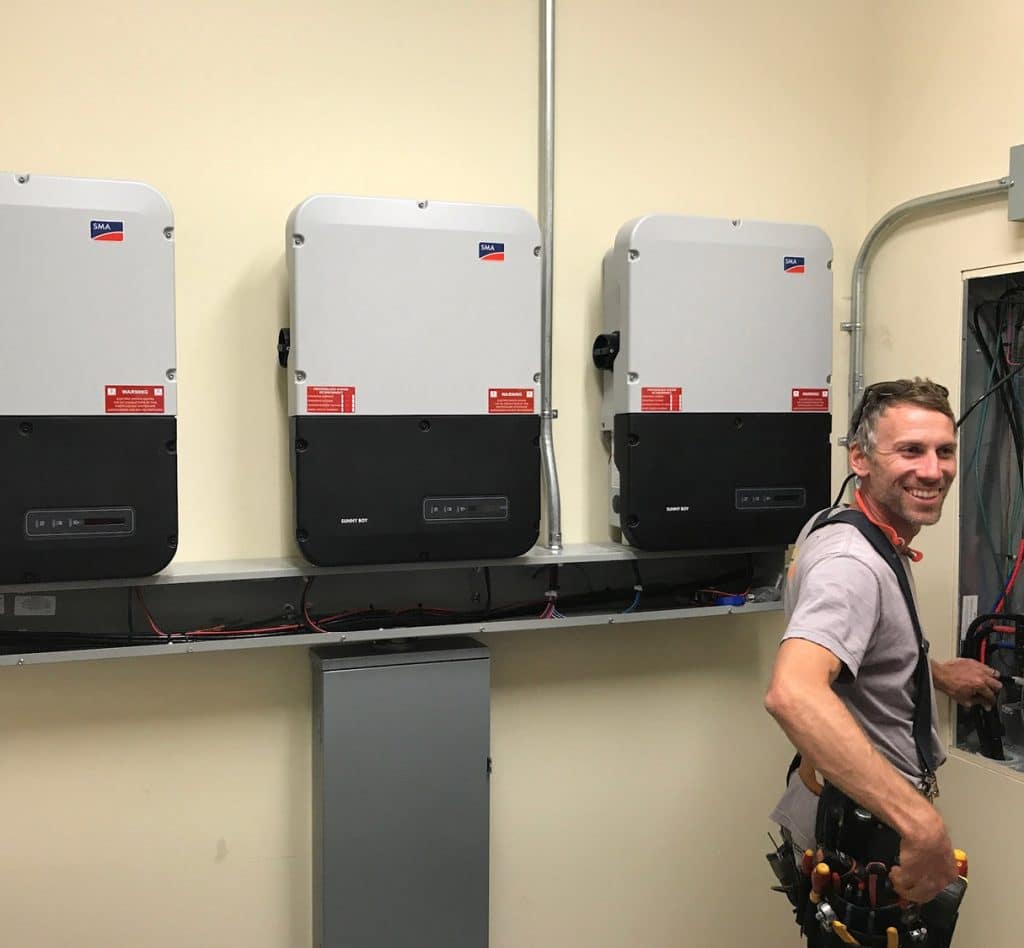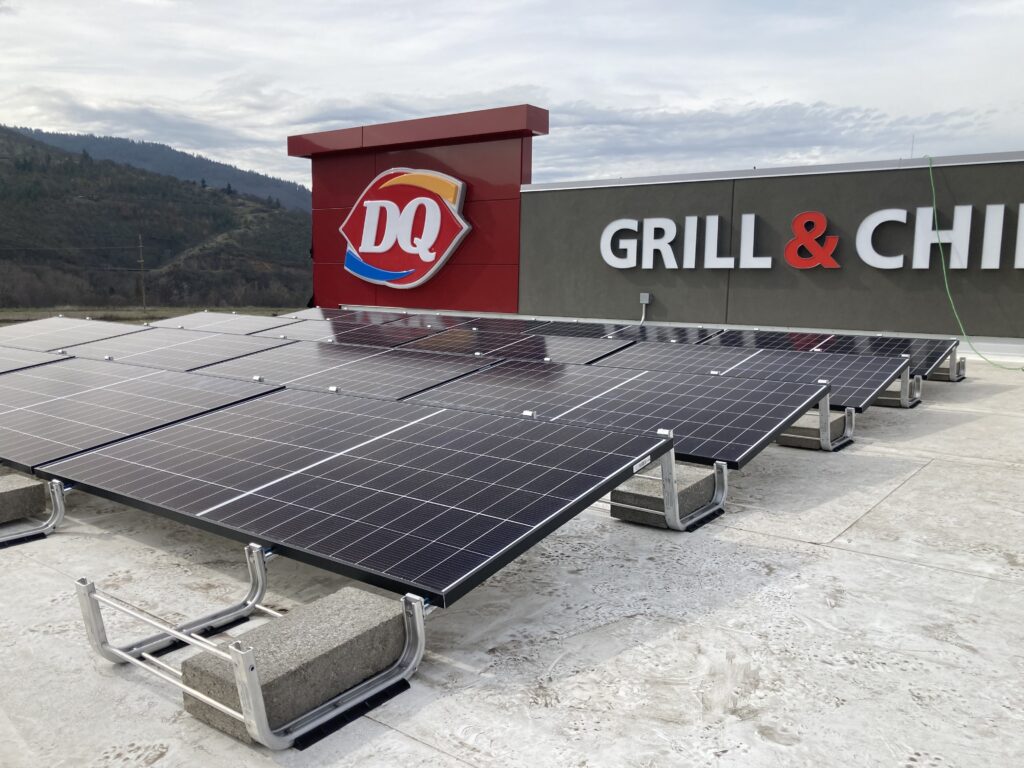

True South Solar has been in business installing solar panels for businesses since 2010 (our first commercial solar project was with Darex, now named Work Sharp). Our Solar Experts have a combination of decades of experience installing solar at businesses in Southern Oregon. We work with business leaders to help them reduce costs with solar power. We have installed solar panels at dozens of businesses around Southern Oregon, including the Rogue Valley Airport, Mt. Ashland Ski Area, Southern Oregon Subaru, SOU, and many others.
No, solar is not free. If something seems too good to be true, it usually is. If you have been led to believe that putting solar on your home or business is free, that is a false and misleading claim. We’re sorry to see these ads misrepresent the solar industry.
On the other hand, we do our best to make solar affordable for all members of our community. We are an Energy Trust of Oregon Trade Ally. Our team will help you procure funding for solar through them as well as any other incentive out there.
The REAP Grant is one opportunity for businesses and agricultural producers in our area. This program can significantly reduce your business’s energy costs.
When you go solar, you will own your own power plant. With your investment, you lock in your savings, rather than paying increasing costs to the power company over time.
Local businesses qualify for the federal 30% (or more) Investment Tax Credit and REAP Grants can cover up to 50% of project costs.
Your energy use and the size of your solar energy system will determine your actual savings amount. With little or no startup costs, systems start paying for themselves immediately and increase each year as the cost of electricity rises. A typical return on investment is usually about 15-20%.
Solar photovoltaic (PV) panels convert sunlight to electricity. Commercial string inverters convert the power into AC current usable at your business. The panels are usually connected to the electric grid and directly power your business, which allows you to pull less, or during certain times, no electricity from the utility.
See below for information about Net Metering and how this enables you to have solar power year-round and at night.
Our systems are guaranteed for 25 years, though they are engineered for over 40 years. When you invest in solar, your energy costs become a fixed cost until you pay it off. You won’t have to endure power costs that seem to be spiraling out of control.
In general, adding solar to a building can add about 4% to its value. There is not very much recent data supporting the exact increase in value as conditions change continually in the solar and residential markets. Here are a few things to keep in mind:
- A solar PV system significantly decreases the occupant’s monthly power bill;
- Owning a solar power plant means that the business owner is producing their own energy;
- The warming planet is becoming a more prevalent issue each year as wildfires become more widespread and hurricanes become more fierce and more homeowners each year want to part of the solution to this problem; and
- If the business also has energy storage like an ELM Microgrid storage solution, the business is much more resilient when power companies shut off power to reduce the potential for wildfires on windy days.
We do our best to provide our business clients a system with a monthly payment that’s close to their current monthly power bill payment, but that’s not always possible.
The cost of your solar system will depend on several factors including: your current energy usage, your available unshaded roof space, your utility’s net metering policy and other factors.
Many businesses are eligible for programs like REAP grants and the federal investment tax credit which significantly reduce system costs.
We recommend getting a free site consultation; we’ll create a proposal with all of the costs and incentives included.
Solar panels or other renewable energy generators are connected to a public-utility power grid and surplus power is transferred onto the grid, allowing customers to offset the cost of power drawn from the utility. Essentially you are charged for power you use and credited for power you produce, which will be the total amount you owe; that accounting process is called “net-metering.”
Solar panels need sun to generate electricity, but even in areas with bad weather your system will still produce. Solar systems continue to produce even when it’s cloudy, your panels just produce less of what they normally would. If you live in a cloudy area, or an area with seasonal snow, your expected weather conditions will be factored into our estimates for your energy production.
Commercial solar electric systems generally require very little maintenance and are maintained by our natural weather cycle. However, some businesses notice that their solar panels get covered with dust produced as part of the normal business practices. Commercial solar installations also consist of numerous arrays with high-throughput inverters and other equipment. Because of this, we offer an affordable operations and maintenance program for our commerical clients, available as a subscription.
You can, but not without a battery backup system. In the event of a blackout, your inverter will automatically shut down for safety reasons (especially power company workers out repairing downed power lines), thus you will not have electricity until power is restored to the grid.
If you’re concerned about the potential loss of power at your home or business, contact us today and we’ll be happy to tell you all about ELM Microgrid and other commercial energy storage solutions and how you can achieve peace of mind.
No, batteries for energy storage are not required for all of the systems we install.
However, as the price of batteries comes down, and their benefits are better understood, solutions like ELM Microgrid storage systems offer uninterrupted power backup for local businesses. So you can go solar now, and add batteries later, or do both! We engineer our systems from the ground up to work for you.
If you live in an area with frequent blackouts, or having power is critical, you should speak with us about battery backup systems. Battery backup systems do add costs to the overall project, but many incentives apply to the complete cost of the system.
Available roof space is an important consideration when designing a solar electric system for businesses. Many warehouses, retail and grocery stores, and other commercial buildings have relatively flat roofs with HVAC and other important infrastructure placed there. Because most of the roof is unused and there are rarely any issues related to shade from trees or other obstructions, your business’s roof is a great place for solar panel placement. The amount of available space can determine the amount of solar energy you generate there that can offset your annual energy use.
Most of the time, rooftop solar can only offset a portion of your energy consumption.
To offset all of your energy use, you can investigate additional ideas like ground-mounted panels, carports, and Southern Oregon’s own Strackers. The Ashland Food Coop placed solar panels on the roof of a business a few miles away. They take advantage of the local utility’s virtual net metering program to offset energy use at their store.
Absolutely. Oregon businesses have low power rates because we benefit from a high percentage of hydropower, but fossil fuels still make up about half of our power mix. Plus, the power must still be transported to us from hundreds of miles away, which is inefficient.
Southern Oregon has a plentiful local solar resource, so the most sustainable choice in our region is solar power.
The companies that manufacture our solar panels have U.S. operations and they are all building new factories in the U.S. to meet the growing domestic demand for solar energy.
When you go solar with True South, you’ll be sending a message to our community that you care about sustainability and reducing your carbon footprint. And from a practical level, it just makes good business sense!
